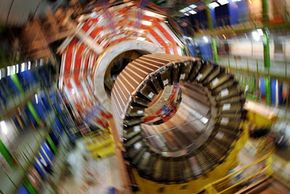What Does the Big Bang Tell Us?
Some cosmologists use the big bang theory to estimate the age of the universe. But due to different measurement techniques, not all cosmologists agree on the actual age. In fact, the range spans more than a billion years!
The discovery that the universe is expanding led to another question. Will it expand forever? Will it stop? Will it reverse? According to the general theory of relativity, it all depends on how much matter is within the universe.
Advertisement
It boils down to gravity. Gravity is the force of attraction between particles of matter. The amount of gravitational force one body exerts on another depends upon the size of the two objects and the distance between them. If there's enough matter in the universe, the force of gravity will eventually slow the expansion and cause the universe to contract. Cosmologists would designate this as a closed universe with positive curvature. But if there isn't enough matter to reverse expansion, the universe will expand forever. Such a universe would either have no curvature or negative curvature. To learn more about curvature of the universe, read "Does space have a shape?"
If we are in a closed universe, eventually the entire universe will contract and collapse in on itself. Cosmologists call this the big crunch. Some theorize that our universe is just the latest in a series of universes generated in a cycle of space expanding and contracting.
According to the big bang theory, there's no center of the universe. Every point in the universe is the same as every other point, with no centralized location. This is difficult to imagine, but it's a requirement for a universe that is both homogeneous and isotropic. From our perspective, it seems like everything in the universe is moving away in the manner suggested by the big bang. One alternative theory is that the Earth itself is the center of the universe, which would explain why everything else is moving away. Cosmologists dismiss this theory because it's extremely unlikely that we'd occupy the central point of the entire universe.
There are also some very big questions the big bang theory doesn't address:
- What happened before the big bang? According to our understanding of science, we can't know. The very laws of science break down as we approach t = 0 seconds. In fact, since the general theory of relativity tells us that space and time are coupled, time itself ceases to exist. Since the answer to this question lies outside the parameters of what science can address, we can't really hypothesize about it.
- What lies beyond the universe? Again, this is a question science can't address. That's because we can't observe or measure anything that lies outside the boundaries of the universe. The universe may or may not be expanding within some other structure, but it's impossible for us to know either way.
- What is the shape of the universe? There are many theories about what shape the universe might have. Some believe that the universe is unbounded and shapeless. Others think the universe is bounded. The big bang theory doesn't specifically address the issue.
Not everyone subscribes to the big bang theory. Why do they disagree with the theory, and what are some of the alternate models for our universe? Read on to see what the skeptics say.
